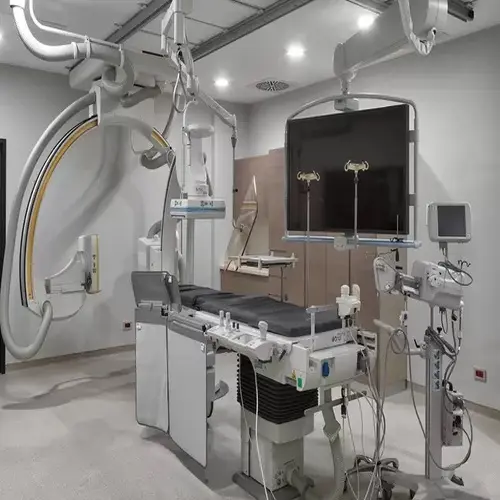


About Hospital
Founded in 1995, Memorial Health Group launched its first hospital project in 1996, aiming to become a global healthcare reference. Memorial Şişli Hospital, completed in 2000, was built with advanced technology and international standards, earning JCI accreditation just two years later as the first hospital in Turkey to achieve this. Spanning 53,000 m², it offers 252 beds, 13 operating rooms, and 4 intensive care units. The hospital is also home to specialized centers, including Organ Transplantation, IVF, Genetics, Stroke, and Oncology, along with Vinci Robotic Surgery.
Hospital Location
Address: Piyalepasa Blv. 34385, Sisli/Istanbul
Nearest Metro: Kulaksiz Yonu is 16 meters away
Nearest Airport: Istanbul Ataturk International Airport
Nearest Hotel: Ibis Styles Istanbul Bomonti Hotel, The Marmara Taksim, Dora Hotel
Get a free cost estimate
Hospital Infrastructure
Memorial Sisli Hospital boasts a modern infrastructure designed for patient comfort and convenience. The hospital features spacious car parking facilities to accommodate visitors effortlessly. It offers free high-speed Wi-Fi across the premises, ensuring seamless connectivity. Patients enjoy top-notch bed facilities with advanced features for comfort and safety. The hospital is equipped with state-of-the-art medical technology, well-designed waiting areas, and 24/7 support services, creating a world-class healthcare environment.
Medical facilities
Memorial Sisli Hospital offers advanced medical facilities for accurate diagnosis and care. Its biochemistry lab performs precise tests for disease detection, while the genetics lab identifies hereditary conditions for personalized treatment. The respiratory center provides therapies for asthma, COPD, and sleep apnea. The tissue typing lab ensures successful organ transplants, and the transfusion center provides safe blood services for surgeries and emergencies.
Specialities
Gynecological Oncology (Gynecologic Cancers)
Cancer is the second leading cause of death globally after heart disease and is rising rapidly, especially gynecological cancers like uterine, cervical, and ovarian cancer in women. Factors such as industrialization, pollution, smoking, and poor diet contribute to its prevalence. Advances in health technology, early diagnosis, and innovative treatments like direct cancer cell therapy and immunotherapy have improved survival rates. For women with gynecological cancers and a desire for children, fertility-preserving treatments are increasingly available. Minimally invasive techniques like laparoscopic and robotic surgeries ensure faster recovery and better outcomes. Memorial Health Group offers advanced, multidisciplinary care for gynecological cancers, combining expertise in oncology, surgery, and genetics.
Pediatric Cardiovascular Surgery
Children with congenital heart conditions can be treated successfully, allowing them to lead normal lives. Pediatric heart diseases include conditions like holes in the heart (ASD, VSD, AVSD), blue baby syndrome (TOF), valve issues, and blood vessel abnormalities. Common surgeries include closing holes in the heart, repairing or replacing valves, correcting narrow arteries, and switching misplaced arteries. Advanced procedures like Norwood, Glenn, and Fontan surgeries are performed for complex conditions like hypoplastic left heart syndrome or single ventricle anomalies. Early diagnosis and timely surgical interventions, often done in infancy or early childhood, prevent complications like lung damage, heart failure, and growth delays, improving the child’s overall health and quality of life.
In Vitro Fertilization (IVF) Andrology and Genetics Center
The Memorial In Vitro Fertilization (IVF) and Reproductive Genetics Center in Turkey is a pioneer in fertility treatments, achieving numerous "firsts" since 1994, including ICSI, MESA, TESE, and embryo freezing. The center has a high success rate, with a 65% pregnancy rate among younger couples, and specializes in advanced cases like recurrent IVF failures, advanced maternal age, and genetic disorders. They perform preimplantation genetic diagnosis (PGD) to prevent hereditary conditions, achieving world-first successes in treating diseases like leukemia and Glanzmann's thrombasthenia. With comprehensive evaluations, cutting-edge technology, and personalized care, the center accepts 3,000 couples annually and is recognized for its global contributions to fertility treatment.
Hematology / Blood Diseases
The Hematology Department specializes in diagnosing and treating benign and malignant blood diseases, including lymphoma, leukemia, multiple myeloma, and performing stem cell (bone marrow) transplants. Common conditions treated include Hodgkin and Non-Hodgkin lymphomas, acute and chronic leukemias, anemia, immune system disorders, and coagulation issues. Advanced techniques like immunohistochemistry, flow cytometry, targeted therapies, and novel drugs have revolutionized treatment, improving survival rates significantly. Memorial Hospital in Istanbul offers high-quality care with an experienced team, cutting-edge diagnostic tools, and support from allied departments like immunology, radiology, and intensive care. Modern therapies enable cures or long-term control for many blood cancers, including aggressive types, with a strong focus on personalized treatment plans and cutting-edge innovations like autologous stem cell transplantation.
Gastroenterology / Hepatology
The Gastroenterology Unit is equipped with cutting-edge technology to provide comprehensive diagnostic and treatment services. Diagnostic procedures include esophagoduodenoscopy for upper gastrointestinal diseases, endoscopic retrograde cholangiopancreatography for biliary and pancreatic conditions, colonoscopy for colon disorders, and liver needle biopsy. Treatments include foreign body removal, esophageal dilation for benign or malignant narrowness, bleeding varices management via sclerotherapy or band ligation, polypectomy for colon polyps, and percutaneous endoscopic gastrostomy for long-term nutrition. Additionally, bile and pancreatic stones are removed using advanced techniques, and stents are applied for obstructive biliary diseases to restore bile flow.
Top Speciality doctor in Memorial Sisli Hospital
- Prof. Abdullah Ozkaya Eye Diseases Specialist
- Prof. Adnan Isgor specializes in general and oncological surgery and performs operations on the endocrine glands
- Prof. Atila TANYELİ is an oncologist, pediatrician and hematologist
- Prof. Bingur Sonmez Cardiovascular Surgeon
- Prof. Fazilet Karakoc Pediatric Chest Diseases Specialist \ Pediatric Health and Diseases Specialist
Procedure
Gastric By-Pass (R-YGB)
Laparoscopic Gastric Bypass (R-YGB) surgery is a common and effective treatment for obesity, reducing stomach size and bypassing part of the small intestine to limit food intake and absorption. It helps achieve significant, long-term weight loss and can improve conditions like Type 2 diabetes. The procedure is performed laparoscopically, with a hospital stay of 3-4 days and a gradual recovery process. Patients follow a carefully planned diet, starting with liquids and progressing to soft and solid foods over six weeks. Proper nutrition, hydration, and avoiding certain foods are essential to prevent complications like dumping syndrome or constipation. Close monitoring by a medical team ensures successful outcomes.
HIFU
HIFU (High-Intensity Focused Ultrasound) is a non-surgical treatment for early-stage prostate cancer that targets only the diseased area, preserving healthy tissues. Available at Memorial Bahçelievler Hospital, it reduces risks like urinary incontinence and sexual dysfunction. The procedure uses ultrasound waves to heat and destroy cancer cells, lasts 1-2 hours, and allows for a quick recovery often with just a one-night hospital stay. HIFU is ideal for early-stage patients, those unfit for surgery, or those seeking minimally invasive options. It’s safe, effective, and causes minimal pain or complications.
Botox
Botox is a protein-based treatment derived from Clostridium botulinum bacteria, widely used for cosmetic and medical purposes. It reduces wrinkles, contours the face, treats excessive sweating, and manages migraines by temporarily blocking nerve signals. The procedure is quick, minimally painful, and starts showing results within a week, lasting 4-6 months. Botox is safe when performed by experts and does not cause expression loss if applied correctly. However, it is not recommended during pregnancy, breastfeeding, or for individuals with certain neuromuscular disorders. Regular sessions can be done safely under medical supervision.
Liver Transplant
Liver transplant is the only treatment for chronic liver failure, often caused by cirrhosis, hepatitis, or alcohol abuse. It involves replacing a diseased liver with a healthy one from a donor, either deceased (cadaveric transplant) or living (living donor transplant). The procedure aims to restore the patient's health and quality of life. Liver transplant carries risks due to the severity of the patient's condition and the complexity of the surgery. Patients must take immunosuppressive medication for life to prevent organ rejection and ensure the success of the transplant.
Heart Valve Replacement
Heart valve replacement or repair surgery is performed to treat conditions like stenosis (narrowing of the valve) or regurgitation (leakage of the valve), which put strain on the heart and can lead to heart failure. The surgery involves removing or repairing the diseased valve and replacing it with a mechanical or biological one. While mechanical valves require long-term anticoagulant use, tissue valves have a limited lifespan. Recovery involves regular follow-ups, anticoagulant management, and lifestyle adjustments. Minimally invasive options like Mitraclip or TAVI are available for certain patients.
Awards
- Awarded with Joint Commission International (JCI) Accreditation
- Awarded with Best Hospital Awards
- Awarded with Innovation in Healthcare Awards
- Awarded with Patient Satisfaction Awards
- Awarded with Research and Development Awards
- Awarded with Community Service Awards
